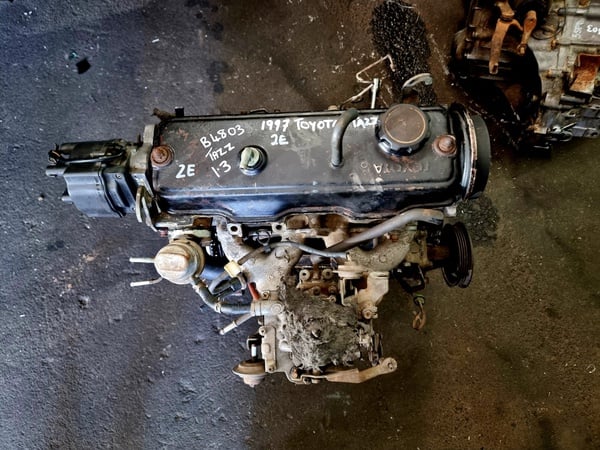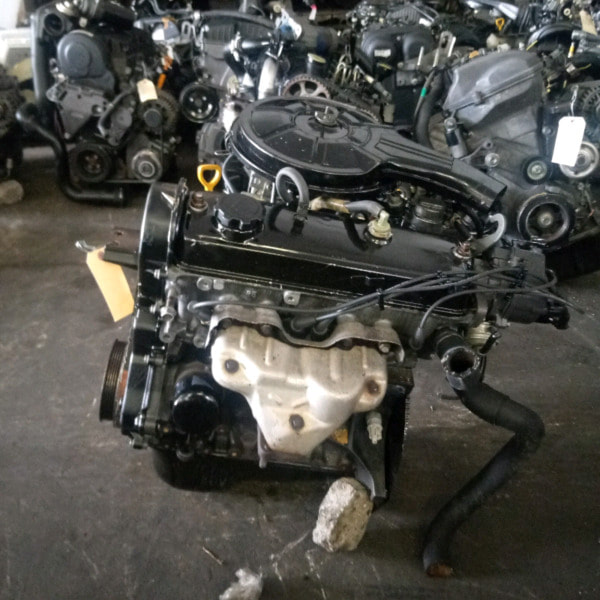Transform Your Car: Toyota Tazz Engine for Sale at Unbeatable Costs
Wiki Article
Engine Buying Specialist Tips on Selecting the Right Engine for Your Details Demands
Picking the ideal engine for your specific demands entails a complicated interaction of aspects that go beyond simple horse power figures. By delving right into the complexities of power versus efficiency, assessing gas rankings, and budgeting for long-term costs, one can genuinely optimize their engine choice.Power Vs. Effectiveness: Finding the Balance

When selecting an engine, it is vital to strike a balance between power and effectiveness to fulfill your certain demands properly. Power refers to the engine's capability to produce power for propulsion, establishing factors like acceleration, pulling ability, and overall efficiency (Toyota Tazz Engine For Sale). On the various other hand, efficiency connects to exactly how well the engine makes use of fuel to produce power, influencing variables such as gas economic situation and environmental kindness
Achieving the appropriate equilibrium between power and efficiency is vital due to the fact that an engine that is also effective might consume excessive gas, leading to greater operating costs and unnecessary stress on the atmosphere. Conversely, an engine that focuses on efficiency over power might result in slow efficiency, specifically popular circumstances like towing heavy lots or driving uphill.
To make a notified choice, take into consideration aspects such as your normal driving conditions, the designated use the car, and your personal choices. By examining your top priorities and needs, you can select an engine that strikes the excellent equilibrium between power and performance, making certain optimal efficiency while decreasing ecological effect and operating expenses.
Understanding Engine Dimension and Type

Common engine types include inline engines, V engines, and rotating engines, each with its one-of-a-kind advantages and drawbacks. Recognizing the interplay in between engine dimension and type is vital in choosing an engine that straightens with your details needs and priorities, whether it be power, performance, or an equilibrium of both.
Consider Your Automobile's Requirements
If you are looking for an engine for a sturdy truck that will be used for towing, you will certainly require a powerful engine with high torque abilities. On the various other hand, if you are picking an engine for a compact vehicle primarily utilized for city commuting, fuel efficiency may be a more important variable to think about.
Evaluating Fuel Efficiency Scores
Analyzing fuel effectiveness ratings is a crucial element of selecting the right engine for your automobile, Check This Out making sure expense savings and environmental sustainability. Gas efficiency rankings, normally measured in miles per gallon (MPG) for gasoline engines or kilowatt-hours per 100 miles (kWh/100 miles) for electrical engines, indicate just how much a lorry can take a trip on a certain amount of gas or electrical energy. Higher MPG or lower kWh/100 miles values symbolize extra reliable engines, converting to minimized gas costs and lower carbon emissions.Furthermore, compare different engine options within the very same vehicle course to determine the most cost-effective option. Factors such as engine dimension, weight, the rules of aerodynamics, and hybrid or electric abilities can all influence fuel effectiveness.
Budgeting for Long-Term Costs
Tactically preparing for lasting costs is vital when picking an engine, guaranteeing economic sustainability over the car's life expectancy. While the initial acquisition cost of an engine is a considerable variable, it is vital to think about the lasting prices related to maintenance, fixings, and fuel usage. Choosing an extra fuel-efficient engine may have a greater upfront cost yet can cause substantial cost savings over time. Normal maintenance, such as oil modifications, filter replacements, and tune-ups, is important to maintain the engine running efficiently and efficiently, decreasing the risk of pricey repair work down the line. indexMoreover, looking into the availability and cost of replacement parts for the picked engine is vital in budget preparation. Engines with easily offered and budget friendly components can considerably impact lasting upkeep expenses. Additionally, taking into consideration the engine's sturdiness and expected life-span can assist stay clear of unanticipated substitute costs in the future. By carefully budgeting for these lasting costs and factoring them right into the decision-making process, her response people can choose an engine that not just satisfies their immediate requirements but additionally remains cost-efficient throughout its life expectancy.
Final Thought
In conclusion, choosing the appropriate engine for your particular demands requires balancing power and performance, understanding engine dimension and type, considering your automobile's requirements, assessing gas efficiency ratings, and budgeting for long-lasting prices. By carefully considering these aspects, you can make certain that you choose an engine that meets your needs and provides optimal efficiency for your vehicle.To additionally improve the option procedure of an engine that strikes the optimum balance between power and effectiveness, it is necessary to dive right into the intricacies of understanding engine size and type. Engine size refers to the total volume of air and gas that can be pressed via the engine cyndrical tubes. Usual engine kinds consist of inline engines, V engines, and rotating engines, each with its one-of-a-kind benefits and drawbacks. Comprehending the interaction between engine size and type is important in selecting an engine that aligns with your specific needs and priorities, whether it be power, performance, or an equilibrium of both.
Gas effectiveness scores, usually determined in miles per gallon (MPG) for gasoline engines or kilowatt-hours per 100 miles (kWh/100 miles) for electric engines, show just how much a car can travel on a specific quantity of gas or electrical energy.
Report this wiki page